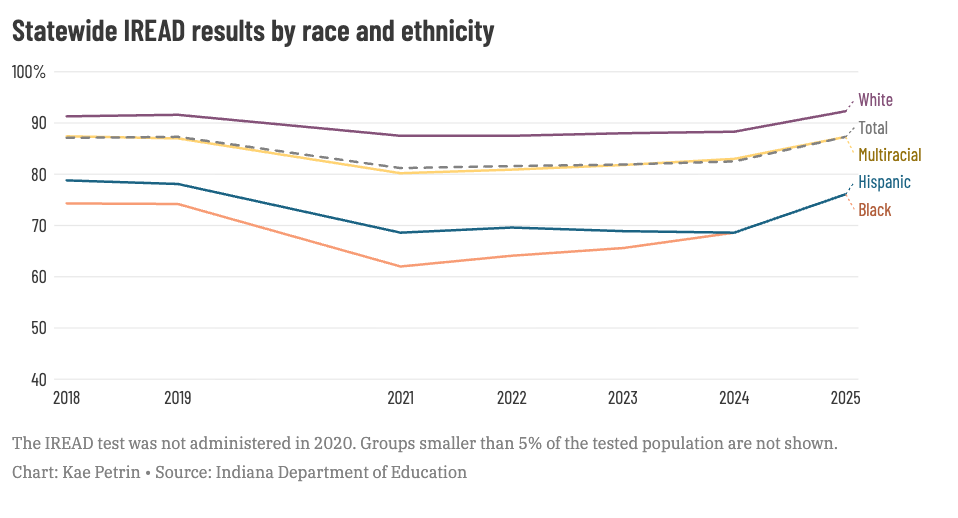Welcome back to the education newsletter from the George W. Bush Institute.
The recent release of the 2024 reading scores from the National Assessment of Educational Progress (NAEP) underscores a sobering reality: the vast majority of American students, roughly two-thirds, read at or below the Basic level. For older students who are behind, this means they can struggle to comprehend – and then think critically about – what they are reading. They may not recognize bias and lack the skills to evaluate evidence or understand different perspectives.
Our nation is in the midst of a reading crisis – and as technology and artificial intelligence continue to advance, this crisis will only become more profound if we fail to take action.
In the second edition of our monthly newsletter, we take a closer look at this crisis – what’s driving it and what it will take to turn the tide. We highlight Indiana’s recent success as a model for effective state action and share insights from leading policy experts on the critical actions education leaders should take to improve student outcomes.
If you’re new to the Bush Institute, welcome. We’re a nonpartisan organization dedicated to promoting freedom, opportunity, accountability, and compassion. We believe that education is more than just a pathway to individual opportunity – it’s also the foundation of a strong and healthy society. When children have access to a great education, they’re better prepared to succeed in school, in the workplace, and as active citizens in their communities.
If this newsletter was forwarded to you, and you’d like to receive future editions directly, please let us know – we’d be glad to add you to our list.
Thank you for reading.
Monthly snapshot
“Nobody likes doing something that they’re not good at. They may love the idea of reading, but they don’t like the act of reading.”
— Holly Lane, director of the University of Florida Literacy Institute, in response to a new study that reading for pleasure has dropped by more than 40% across all age groups
This troubling decline carries profound consequences for learning. Two major factors help explain the shift:
- Kids aged 8 to 18 are spending an average of 7.5 hours a day engaged with screens. As screen time increases, students spend less time in sustained, immersive reading, weakening the habits that support deep thinking and comprehension.
- Inconsistent implementation of evidence-based literacy instruction in elementary schools means many students never develop the foundational skills and the confidence to make reading enjoyable. By the time they reach secondary school, these students often lack the reading stamina needed to engage with complex texts.
State spotlight: Indiana – a blueprint for literary gains
Amid widespread declines in student achievement, Indiana stands out as a bright spot. The state has made consistent, measurable progress in reading, demonstrating that state leaders have the power to rapidly and meaningfully reverse the trajectory of the literacy crisis.
- According to the 2024 National Assessment of Educational Progress (NAEP), Indiana now ranks sixth in the nation for reading proficiency in both fourth and eighth grades – up from 19th and 17th, respectively, in 2022.
- Results from IREAD, the state’s statewide reading assessment, show third graders made a record-breaking leap. In 2025, 87.3% of students passed Indiana’s reading assessment, a five-point jump from 82.5% in 2024 – the largest single-year increase since the test began in 2013. All student groups made gains, with Black students and English learners each improving by about 7 percentage points.
This progress follows Indiana’s $111 million investment in literacy coaching, which provides teachers with expert training in evidence-based reading instruction. By the 2025–26 school year, the state aims to place literacy coaches in 60% of elementary schools.
Indiana is also reforming teacher preparation. Beginning in 2025, all applicants for a Professional Educator License must earn an early literacy endorsement –ensuring every new teacher is equipped to support reading development, regardless of subject.
“Indiana’s recent success in literacy reform stands as a compelling example of what evidence-based policy, bold leadership, and a sense of urgency can accomplish,” wrote founder of ExcelinEd and former Florida Gov. Jeb Bush in a recent op-ed.

Measurement matters
- Student achievement is declining overall, but lower-performing students are being hit the hardest, policy expert Chad Aldeman points out in his analysis of 2024 NAEP results. These growing gaps aren’t just about race, income, or parental education – they reflect common teaching practices that neglect foundational reading skills and lack accountability. To turn things around, schools need a two-part strategy: Support all students in catching up, while urgently focusing on those who are the furthest behind.
- The declines in NAEP scores point to a longstanding erosion in foundational skills that predate the pandemic, Christy Hovanetz, senior policy fellow for ExcelinEd, contends in a recent article in Governing. She argues that to reverse these declines, states must adopt rigorous accountability systems with a stricter focus on measurable student outcomes and ensure schools are held responsible for real academic gains.
Bush Institute Insights
Transparency is key to the success of Texas’ Education Savings Account program
As the Texas comptroller moves forward with implementing the state’s new Education Savings Account (ESA) program, it is essential to equip families with clear, accessible information to help them make informed choices – and to lay the foundation for the program’s long-term success.
In written testimony submitted in September, I urged the Comptroller’s Office to adopt several key measures:
- Make annual assessment data easily accessible and understandable for parents.
- Require participating schools to provide transparent information on enrollment processes, admission requirements, and seat availability.
- Ensure that all details about the ESA program are clearly communicated and widely publicized.
























